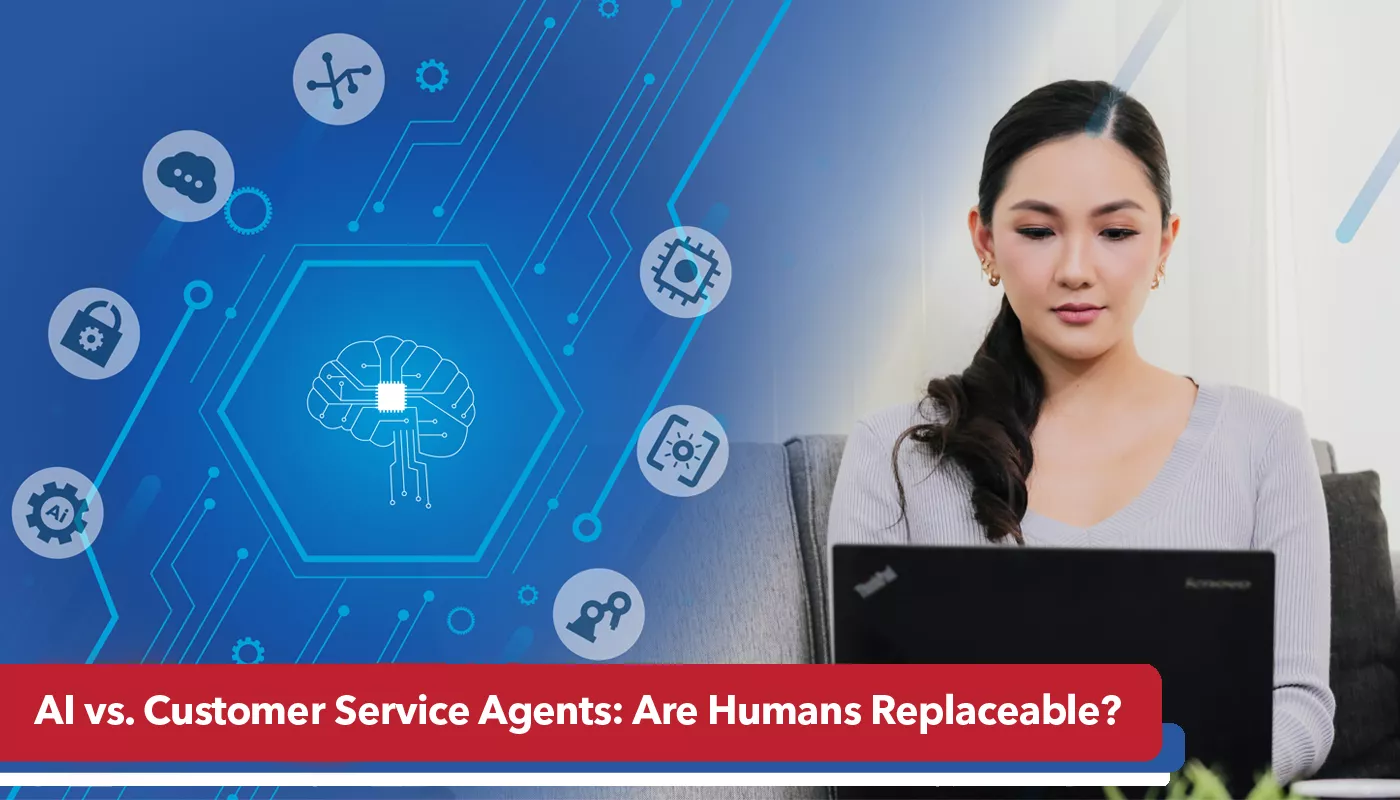
When people hear “artificial intelligence,” many still picture the futuristic humanoid robots commonly seen in science fiction movies. The truth, however, is that AI is more than just a sci-fi creation or an invention we’ll only find in the far future.
AI already exists, and many customers may knowingly or unknowingly interact with it daily.
These days, many businesses utilize AI solutions in various industries, from manufacturing to healthcare. And one of the most common uses of AI in business is in the customer service outsourcing field.
This article will take a closer look at how AI shapes the future of customer service. We’ll also answer a crucial question that many organizations are likely to ask, “Can AI replace human agents?” Let’s find out!
The Role of Artificial Intelligence in the Customer Service Industry

For the most part, the primary function of AI in the call center industry is to automate customer service processes. Most companies use AI solutions to reduce the workload of CSRs, leading to less paperwork, fewer callbacks, and shorter waiting time for customers.
Additionally, AI-powered customer service can help provide more direct and personal interaction, which can be crucial for serious customer issues. For example, AI can help you synchronize data across different customer support platforms, giving agents a bird’s eye view of a customer’s history and interactions with the brand.
By 2025, AI technology will power 95% of online chats, including telephone calls. Regardless of your business’s specific ins and outs, AI can make life easier for you, speeding up your operations and assisting your team in providing exceptional customer service.
Can AI Replace Human Call Center Agents?
The straightforward answer is: No.
Although AI in customer service offers many benefits for companies, it cannot replace real human interaction, especially in today’s post-pandemic world. Research has found that 50% of buyers believe that their experiences during COVID-19 made them see customer service as more of a priority when interacting with brands.
Customers today don’t want to be seen as a “number.” They want to feel an authentic and genuine connection with their chosen brand. Eighty percent say they are more inclined to purchase when brands provide personalized customer service.
What’s the Difference Between AI and a Human Agent?
Though helpful in completing automated customer service functions and reducing repetitive workload for support agents, the AI-powered software we see today still needs to be comparable to human intelligence and, most of all, genuine human connection.
Customer service AI can only mimic human-like functions through data and continuous training, but it cannot achieve the thought process and problem-solving ability unique to humans.
AI in customer service can help resolve straightforward client issues immediately, but support agents are better at dealing with more complex, potentially emotion-filled concerns that require a human touch.
For instance, a human customer support team can learn from past mistakes, quickly adapt to new situations, and find a way to deal with previously unresolved customer queries. On the other hand, AI customer support can only answer customer questions that have already been uploaded to its database.
It would take years for the AI to learn a completely different set of functions, unlike customer service employees, who can be trained for new tasks and cases.
Read More: Customer Support Wish List: What Your Customers Really Want
What Are the Practical Uses of Customer Service AI?
Chatbots
The most common application of artificial intelligence in customer service is through chatbots. Businesses program chatbots to answer frequently asked customer inquiries and resolve them.
With low-level issues resolved, call center agents can assist more individuals and concentrate on more complex cases, all while the organization lowers its operational costs.
Agent Assist Technology
Another way artificial intelligence is used in customer service outsourcing is through Agent Assist Technology. These value-adding technologies offer small but vital assistance to call center agents, helping them save time when completing their day-to-day responsibilities and reducing their overall workload.
One example of this AI application is Google Cloud. It recommends phrases used by top CSRs to improve the quality and consistency of customer experience, suggests knowledge base content to solve customer problems quicker and easier, and transcribes calls in real time for reference and analysis.
Customer Self-Service Platforms
According to the Harvard Business Review, 80% of customers prefer resolving issues independently. Many try to find answers to their queries by turning to forums, search engines, or a company’s website before calling a customer service representative.
Through artificial intelligence, companies can give consumers more options when resolving issues independently. AI-powered self-service tools can allow customers to speak to bots normally and resolve their problems without going through a complicated series of menus.
Research has found that businesses utilizing self-service bots reap higher customer satisfaction rates, an enhanced agent experience, decreased costs, and even an increase in revenue.
AI-powered self-service tools are also beneficial to call center agents. These platforms allow agents to easily search for relevant and correct information in real-time, assisting their decision-making while speaking to customers on the phone.
Natural Language Processing
Nowadays, about 30% of interactions with technology involve using voice search to have “conversations” with smart machines. This remarkable feat is made possible through Natural Language Processing (NLP), a subset of AI that understands, interprets, and analyzes verbal language.
Conversational AI (such as Google Assistant, Amazon’s Alexa, or Apple’s Siri) detects and processes customers’ words, phrases, and sentences, then uses search engines to provide an answer. This speech recognition software gives customers a quicker and easier way to communicate their queries without human input.
Although Natural Language Processing technology is valuable for consumers looking for a speedy answer to their search, it can also be used by customer service outsourcing teams.
Agent Assist Technologies often utilize NLP to help customer support reps better understand what a client is saying and feeling or even shift through knowledge base content to recommend how an agent can reply to the customer.
The Advantages of Using AI in Customer Service

Reduced Workload for Agents
During the pandemic, 74% of BPO leaders worldwide saw increased demand for customer support across digital channels. The same study found that 50% believe that the mental health of their call center agents suffered due to the sudden increase in call volumes.
What can companies do to help reduce stress and burnout among customer service representatives without sacrificing the needs of their clients? Artificial intelligence can help lighten the workload of these overworked and understaffed call centers.
Various AI tools have been developed to help customer service teams focus on their core responsibilities while leaving tedious and repetitive tasks to bots. For instance, some AI technologies use intelligent routing algorithms to screen calls and send them to the best agent for the job.
Other machine learnings and AI tools offer real-time assistance for agents, guiding specific questions asked by clients. With these emerging technologies, agents can focus on meeting client needs, leading to greater customer satisfaction.
A More Seamless Omnichannel Customer Experience
Nowadays, more is needed for a brand to provide customer service over the phone. In today’s marketplace, consumers want to reach customer support through the method or platform they choose, whether through email, social media, or live chat.
To succeed, brands must be willing to invest in omnichannel customer service.
For example, imagine that a customer regularly interacts with your brand through social media messages. When they reach out through the phone, they may want an agent already to know these previous conversations, interactions, and history when they bring up their feedback or query.
Artificial intelligence can help call centers more efficiently and effectively integrate their customer service channels into one seamless multi-channel experience. By investing in omnichannel customer support, brands can offer their consumers more personalized services and experiences.
Shorter Hold Times and Increased Efficiency
One of the biggest challenges customer service teams face is answering and resolving inquiries quickly. According to HubSpot’s research, 90% of consumers prefer an “immediate” response from a customer service representative, and 60% define “immediate” as less than or about 10 minutes.
When customers don’t get a speedy response to their call, email, or message, they may feel disheartened or frustrated, leading them to take their business elsewhere.
Thankfully, artificial intelligence can help improve the efficiency and productivity of customer service representatives. By automating tasks that agents once had to perform manually, AI allows CSRs to reach call resolutions quicker and move on to the next waiting customer as soon as possible.
Studies have shown that call centers utilizing AI can take on twice as many calls compared to those that don’t use this technology. In addition, Al enables BPOs to improve crucial KPIs, such as their Average Speed of Answer (ASA), Automatic Call Distribution (ACD), and abandon rates.
The Future of AI and Customer Service: What Can We Expect?
We live in the age of digital transformation, with more and more new technologies being invented for our daily use. As mentioned earlier, AI software is becoming more advanced every day, and this tool is bound to become more widespread.
It’s no secret that AI is here to stay in customer service. Gartner estimates that 70% of customer interactions this year already involve emerging technologies, compared to only 15% in 2018.
However, to fully utilize AI for customer support, companies need a reliable human customer service operation as their foundation. And investing in customer service outsourcing can be the key that opens the door to your business growth.
Working with an outsourced customer service team can give your company access to the latest technologies (including machine learning and AI software), expand your workforce and capabilities, and help you achieve better customer retention and satisfaction.
Bonus Read: Do You Want To Read More About the Topic?
Frequently Asked Questions (FAQs) about AI in Customer Service
Is AI in customer service expensive?
The answer: It depends on the specific AI tool. Chatbot prices can vary significantly depending on the particular software.
However, on average, AI solutions don’t require a large initial investment and can help deliver significant cost savings when used alongside human support teams.
How is AI transforming the customer service field?
One advantage of AI is that it helps provide better customer service by delivering proactive support. Since it can be programmed to identify patterns based on past customer behavior, AI customer support allows agents to anticipate buyers’ future problems potentially.
Current customer service tools are designed to help support teams react to already existing client feedback. However, as AI software becomes more advanced, it can proactively identify process improvements or recommend new ways to meet customer needs before they even file a complaint.
Is AI the future of customer service?
According to Gartner, organizations have an average of 35 AI projects in place, increasing from an average of only four projects in 2019. The same research found that a significant portion of AI investment is dedicated to customer service.
Although AI is unlikely to replace a human support team fully, we can only imagine the new possibilities and opportunities this emerging technology can bring to the industry’s future.
How do consumers benefit from AI?
The truth is that AI customer service is beneficial not only for businesses but also for the average, everyday consumers.
Today, many customers prefer the convenience of live chat and social media over phone calls when resolving an individual complaint. Chatbots and other AI solutions can help answer these customer concerns quickly and efficiently.
What is the best way to use AI in customer service?
Instead of seeing machine learning and AI tools as a way to replace human agents, the best way to maximize these technologies is by using them to support your team and aiding them in providing a more seamless customer experience.
Why can’t an AI solution replace human jobs?
AI is unlikely ever fully to replace human agents. The fundamental role of AI in customer service outsourcing will be automating manual tasks, dealing with routine or lower-level issues, and helping contact centers become more customer-centric.
Through AI, call center agents can focus on solving high-priority or complex problems, all while giving their very human customers the empathetic and dedicated service they deserve.
What jobs will be replaced by AI?
Although AI-powered customer service can’t compete with human agents when providing empathetic, humanized support, it can easily take on routine tasks and job functions. Examples include handling extensive data collection, tracking agent performance, or resolving frequently asked customer queries.
What are the primary benefits of human customer support over AI?
Providing excellent customer service is more than just answering questions as quickly as possible. Customers crave a genuine connection; they want to feel that support teams understand their concerns and care about helping them resolve them.
When it comes to fostering customer loyalty and satisfaction, nothing beats an authentic human touch, and this is something AI software cannot yet provide. In addition, customer service employees can multitask, gather qualitative data, and handle complex issues.
What are the risks of using AI in customer service?
Although AI is a valuable tool for business, there are still risks and limitations involved in its use. Companies must take these risks into account before making an AI investment.
An AI is only as helpful as the data it utilizes, meaning that data quality is a must-have for its effectiveness. One of the issues a company may encounter is unknowingly uploading poor quality or inaccurate data to the AI software, creating operational problems in the long run.
Additionally, AI-powered customer service programs need to be regularly upgraded. Without proper maintenance, you may risk losing essential code or data, which can be costly and time-consuming to restore.






